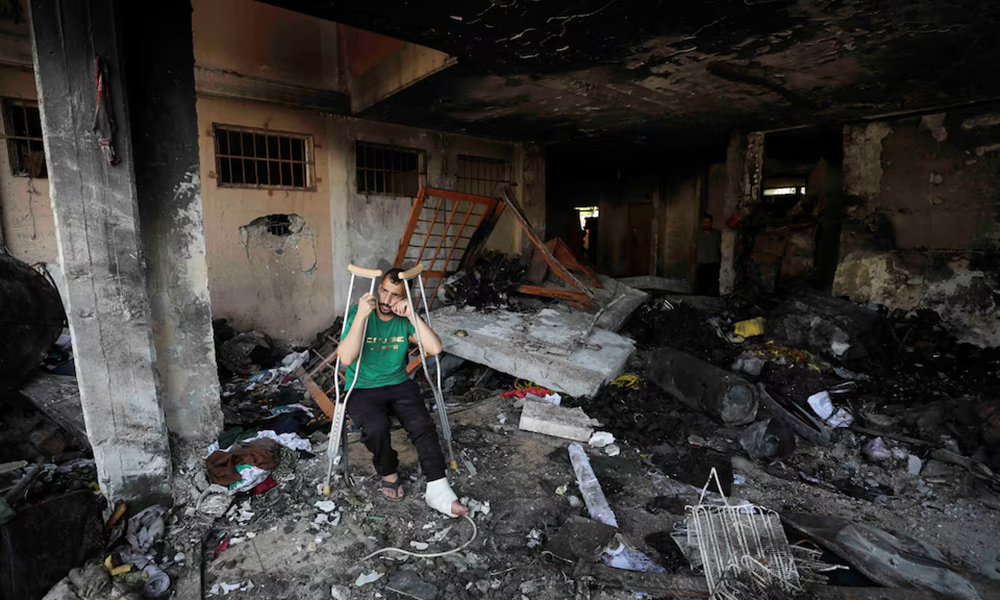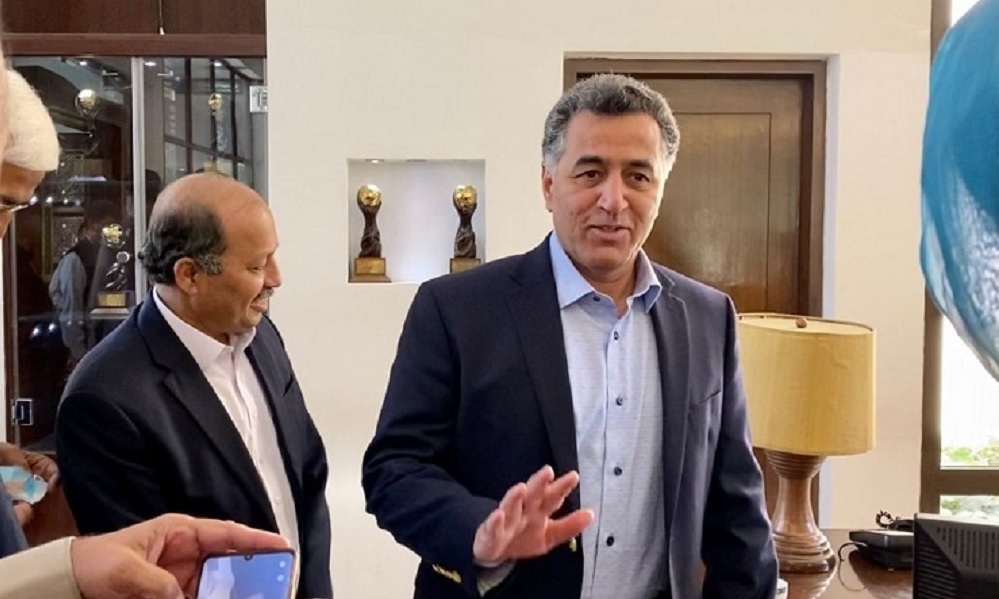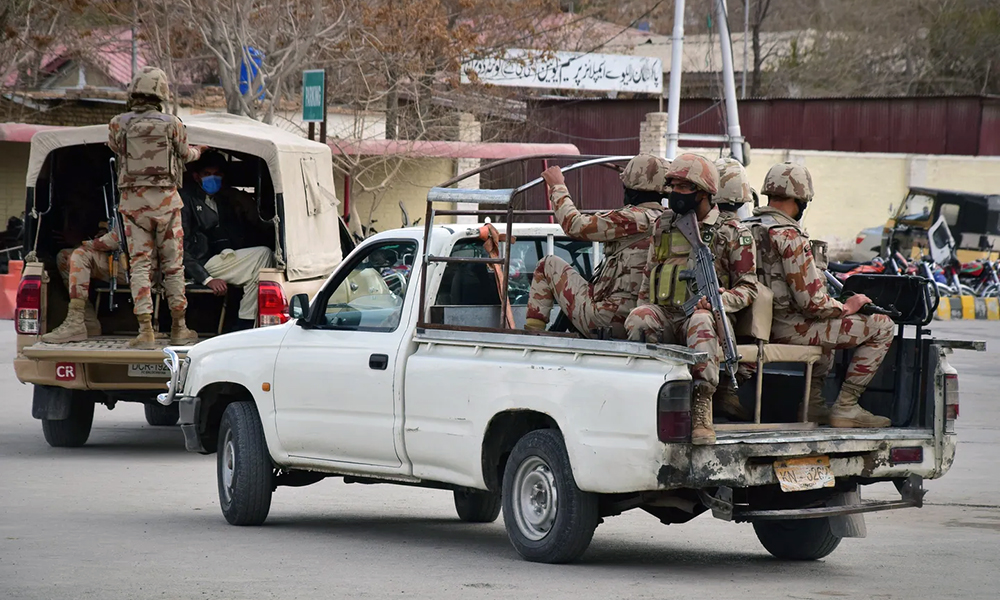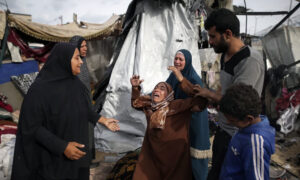Regional
Israeli airstrikes kill at least 24 in Gaza City, health officials say
Gaza health officials said at least 45 Palestinians had been killed by Israeli military strikes across the densely populated coastal enclave on Tuesday.

Israeli forces killed at least 24 Palestinians in three separate airstrikes on Gaza City early on Tuesday and the dead included a sister of Ismail Haniyeh, the chief of militant Islamist group Hamas, Gaza health officials and medics said.
Israeli tanks also pressed deeper overnight into western areas of Rafah in the enclave’s south, blowing up homes, residents said.
Two of the Israeli airstrikes hit two schools in Gaza City, killing at least 14 people, medics said. Another strike on a house in the Shati (Beach) camp, one of the Gaza Strip’s eight historic refugee camps, killed 10 others.
The house in Shati belonged to the extended family of Hamas political chief Haniyeh, who is based in Qatar. One of his sisters was killed along with other relatives, family members and medics said.
Haniyeh, who leads Hamas diplomacy and is the public face of the group that has run Gaza since 2007, has lost many relatives in Israeli airstrikes since Oct. 7, including three sons.
Responding to the latest Israeli attack that killed his sister, Haniyeh reaffirmed the group’s demands for reaching a ceasefire agreement with Israel and said killing relatives would not influence Hamas actions.
“We still maintain that any agreement that does not guarantee a ceasefire and an end to the aggression is not an agreement. Our position on this will not change at any stage,” Haniyeh said in a statement.
Hassan Kaskin, a neighbour, said the Haniyeh family house was hit without advance warning before dawn on Tuesday. Footage obtained by Reuters showed the multi-floor building reduced to rubble.
“They were 10 individuals, three of them were scattered outside the house and seven under the rubble – with no prior warning, with people around them, and there are injuries among the neighbours,” Kaskin told Reuters.
Israel’s military said its forces had targeted militants overnight in Gaza City who had been involved in the planning of attacks on Israel. The militants, it said, included some who had seized hostages as they took part in the Hamas-led cross-border attack on Israel on Oct. 7 last year.
The Israeli Air Force bombed two structures “used by Hamas terrorists in Shati and Daraj Tuffah in the northern Gaza Strip. The terrorists operated inside school compounds that were used by Hamas as a shield for its terrorist activities”, the military said in a statement.
Hamas denies using civilian facilities such as schools and hospitals for military purposes.
Separately, the armed wings of Hamas and the allied Islamic Jihad said in a joint statement their fighters had fired mortar bombs overnight against Israeli forces in the Yibna neighbourhood of eastern Rafah.
In the city of Khan Younis to Rafah’s north, medics said Israeli tank shelling killed seven Palestinians and wounded several other people at a tent camp in a western district.
Gaza health officials said at least 45 Palestinians had been killed by Israeli military strikes across the densely populated coastal enclave on Tuesday.
The United Nations Palestinian refugee agency (UNRWA) said chaos was taking hold in Gaza as smuggling bands form, adding to the difficulties of delivering sorely needed aid to the territory.
A high risk of famine also persists across the Gaza Strip as the conflict rages on unabated and humanitarian access remains restricted, a global hunger monitor said on Tuesday.
HEZBOLLAH CONFLICT
Over eight months into the war, international mediation backed by the U.S. has failed to yield a ceasefire agreement. Hamas says any deal must bring an end to the war and full Israeli withdrawal from Gaza, while Israel says it will accept only temporary pauses in fighting until Hamas is eradicated.
Israeli Prime Minister Benjamin Netanyahu said on Sunday the phase of intense fighting against Hamas would end “very soon”, freeing up more forces for deployment on Israel’s northern border with Lebanon, where clashes with Iran-backed Hezbollah have escalated.
Israel’s national security adviser Tzachi Hanegbi said on Tuesday it would spend the coming weeks trying to resolve the conflict with Hezbollah and would prefer a diplomatic solution there. Shelling has led to the evacuation of tens of thousands of people on both sides of the Israel-Lebanon border.
Israel’s ground and air campaign in Gaza was triggered when Hamas-led militants stormed into southern Israel on Oct. 7, killing around 1,200 people and seizing more than 250 hostages, according to Israeli tallies.
The Israeli offensive in retaliation has so far killed 37,658 people, the Gaza health ministry said on Tuesday, and has left the tiny, heavily built-up Gaza Strip in ruins.
Since early May, ground fighting has focused on Rafah, abutting Egypt on Gaza’s southern edge, where around half of the enclave’s 2.3 million people had been sheltering after fleeing other areas. Most have since had to flee again.
Gaza’s health ministry said on Tuesday that hospitals and medical centres in the enclave were experiencing a severe shortage of medicines and medical supplies due to the continued Israeli offensive, Israel’s control and closure of all crossings and its targeting of the health sector in Gaza.
In particularly short supply are medications needed for emergency, anaesthesia, intensive care and operations, the ministry said in a statement. – Reuters
Related Stories:
John Kirby likens Israeli airstrike to US bombings in Iraq, Afghanistan
Israeli strikes kill at least 37 Palestinians near Gaza’s Rafah as offensive expands
Regional
Pakistan’s ex-spy chief jailed for 14 years in rare military rebuke

A military court in Pakistan jailed former spy chief Faiz Hamid for 14 years on four charges including interference in politics, the army said on Thursday, in a rare conviction of a once-powerful general in the South Asian nation.
Hamid, in custody and under trial since August last year, was the chief of Pakistan’s powerful Inter-Services Intelligence agency from 2019 to 2021 under jailed former Prime Minister Imran Khan, and the two were considered close allies.”The accused was tried on four charges,” the military said in a statement, Reuters reported.
The charges ranged from engaging in political activities and violating the Official Secrets Act in a way detrimental to safety and state interest to misuse of authority and resources as well as causing wrongful loss to individuals, it added.
TIES TO JAILED FORMER PM IMRAN KHAN
The former general was found guilty on all the charges, the military said, without detailing the incidents. His conviction followed “lengthy and laborious legal proceedings”, it added, and Hamid has a right of appeal.
He also faces a separate investigation of his role in May 2023 attacks by thousands of Khan’s supporters on scores of military installations and offices to protest against the arrest of the 72-year-old former cricket star.
Information Minister Attaullah Tarar said Hamid had crossed “red lines” and acted as an advisor to Khan’s party to try to create chaos in the country.
Hamid’s lawyers or family could not be reached for comment. Khan’s PTI party did not immediately respond to a Reuters request for comment.
Khan has been in jail since August 2023.
Khan and nearly 150 of his party leaders and supporters have already been indicted by an anti-terrorism court on charges of inciting the attacks that also targeted military headquarters in the garrison city of Rawalpindi.
Khan and his associates deny the charges.
Hamid’s close ties to Khan, who blames the military for ousting him from power in 2022, were a source of tension between the cricketer-turned-politician and the military.
The military, which has directly ruled the nation of 241 million for more than three decades of its 77-year independent history, plays a big role in making or breaking governments.
Regional
Six Pakistani soldiers killed in TTP attack in Kurram District
Islamabad has accused TTP fighters of using Afghan territory to stage attacks inside Pakistan, a claim Kabul denies, insisting that Pakistan’s security problems are internal matters.

Six Pakistani soldiers were killed and four others injured when militants attacked a security checkpoint in northwest Pakistan’s Kurram district, officials confirmed on Tuesday. The Tehreek-e-Taliban Pakistan (TTP) claimed responsibility for the assault.
The attack took place in the Manato area late Monday afternoon, according to a police officer at the district’s emergency control room. A government official, speaking on condition of anonymity, told AFP that two militants were also killed during the exchange of fire.
Security forces later identified one of the dead militants as local TTP commander Usman Khyberi.
The incident comes amid heightened tensions between Pakistan and Afghanistan, as both sides struggle to maintain a fragile calm following deadly border clashes in October—the worst since the Islamic Emirate took control of Kabul in 2021.
Sporadic skirmishes have continued, including heavy exchanges of fire last week that left at least five people dead.
Islamabad has accused TTP fighters of using Afghan territory to stage attacks inside Pakistan, a claim Kabul denies, insisting that Pakistan’s security problems are internal matters.
Efforts to broker a lasting truce have so far failed. Three rounds of peace talks—facilitated by Qatar, Türkiye, and Saudi Arabia—have not produced a breakthrough.
Regional
Putin questions US punishing India for buying Russian oil
Hours earlier, Modi received Putin at the airport in Delhi, a rare gesture underlining the warm ties between the leaders.

Russian President Vladimir Putin challenged heavy U.S. pressure on India not to buy Russian fuel if the U.S. could do so as he began a two-day state visit, where he was embraced on arrival by Indian Prime Minister Narendra Modi.
Putin spoke in comments to Indian broadcaster India Today, aired hours after landing in New Delhi for a visit during which both countries are seeking to boost mutual trade and expand the variety of items in transactions.
New Delhi and Moscow have strong ties going back to the days of the former Soviet Union, and Russia has been the main source of arms for India for decades. India has also emerged as the top buyer of seaborne Russian oil despite Western sanctions imposed after Moscow launched its invasion of Ukraine in February 2022.
India’s crude imports, however, are set to hit a three-year low this month following a punitive U.S. tariff on Indian goods and a tightening of sanctions on Russia, as U.S. President Donald Trump’s administration says India’s purchases of cheap Russian oil help finance Moscow’s war in Ukraine.
“The United States itself still buys nuclear fuel from us for its own nuclear power plants. That is also fuel,” Putin told India Today.
“If the U.S. has the right to buy our fuel, why shouldn’t India have the same privilege? This question deserves thorough examination, and we stand ready to discuss it, including with President Trump,” he said.
India has said Trump’s tariffs are unjustified and unreasonable and pointed at ongoing U.S. trade with Moscow. The U.S. and European Union continue to import billions of dollars worth of Russian energy and commodities, ranging from liquefied natural gas to enriched uranium.
“There is a certain decline in overall trade turnover during the first nine months of this year,” Putin said when asked if Indian oil purchases had fallen under pressure from the West.
“This is just a minor adjustment. Overall, our trade turnover stands almost at the same level as before.”
He added: “Trade in petroleum products and crude oil … Russian oil, is running smoothly in India.”
Asked how India and Russia should deal with Trump and his tariffs, Putin said the U.S. President has advisers who believe that implementing such tariff policies ultimately benefits the U.S. economy. “We hope that, in the end, all violations of World Trade Organization regulations will be rectified,” he said.
Hours earlier, Modi received Putin at the airport in Delhi, a rare gesture underlining the warm ties between the leaders.
They embraced on a red carpet on the tarmac and then drove away in the same vehicle for a private dinner hosted by Modi.
Senior Russian ministers and a large Russian business delegation were in New Delhi for Putin’s visit and the two leaders will hold summit talks on Friday when they are expected to announce a raft of deals.
“Delighted to welcome my friend, President Putin to India. India-Russia friendship is a time-tested one that has greatly benefited our people,” Modi posted on X ahead of the dinner.
India and Russia aim to raise two-way trade to $100 billion by 2030. Their commerce rose more than five-fold from about $13 billion in 2021 to near $69 billion in 2024–25, almost entirely driven by Indian energy imports.
Bilateral trade eased to $28.25 billion in April–August 2025, reflecting a decline in crude oil imports.
At the same time, India is looking for new destinations to increase exports of its goods hit by the punishing 50% tariff imposed by Trump.
Russia wants to import more Indian goods to balance bilateral trade, which is currently heavily skewed towards energy, Deputy Kremlin Chief of Staff Maxim Oreshkin told a business conference in New Delhi earlier on Thursday.
Indian Trade Minister Piyush Goyal said New Delhi wants to diversify exports to Russia and increase sales of automobiles, electronics goods, data-processing equipment, heavy machinery, industrial components, textiles, and foodstuffs.
-

 Latest News2 days ago
Latest News2 days agoMuttaqi: Afghanistan’s progress requires both religious and modern education
-

 Sport4 days ago
Sport4 days agoILT20: Desert Vipers edge Gulf Giants in historic super over thriller
-

 Regional4 days ago
Regional4 days agoSix Pakistani soldiers killed in TTP attack in Kurram District
-

 Business4 days ago
Business4 days agoTrade bodies warn almost 11,000 Afghan transit containers stuck at Karachi port
-

 World4 days ago
World4 days agoPowerful 7.6 earthquake hits northern Japan, tsunami warnings issued
-

 Latest News3 days ago
Latest News3 days agoTrump calls Afghanistan a ‘hellhole’ country as US expands immigration restrictions
-

 Sport5 days ago
Sport5 days agoSorkh Poshan Khafi defeats Sarsabz Yashlar 4-0 in Afghanistan Champions League
-

 Sport3 days ago
Sport3 days agoCommanding wins for Arman FC and Sarsabz Yashlar in Afghanistan Champions League


























